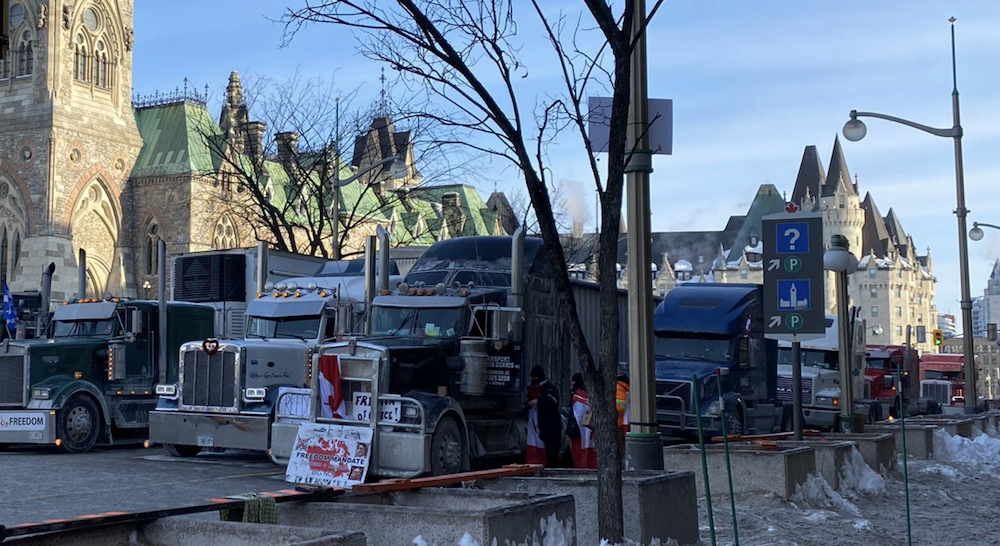It is well-documented that the “truckers protest” in Ottawa has little to do with trucking. Most vehicles in the convoy were not trucks. Most people at the protest are not truckers. And most of the organizers’ demands (from opposing all COVID-19 health restrictions to removing the elected government of Canada) have nothing to do with trucking.
Meanwhile, actual truckers are going about their business—while complying with the dozens of government rules that regulate their industry every day. Requiring double vaccination to cross the Canada-U.S. border without quarantine is just one of those rules. Industry experts say 90 per cent of truckers are vaccinated (roughly the same as the rest of us).
The nebulous connection between trucking and this protest has not stopped right-wing politicians from invoking the rugged image of “hard-working truckers” as a convenient prop for their flirtation with extremism. Erin O’Toole and Jason Kenney spoke glowingly about the dedication and bravery of drivers (it didn’t save O’Toole, and probably won’t save Kenney). Saskatchewan Premier Scott Moe was especially shameless: issuing a phoney “thank you letter” to truckers simply as a gimmick to cancel more COVID restrictions, despite Saskatchewan having one of the worst COVID-19 hospitalization rates in the country.
Real truck drivers face many challenges. They are treated unfairly by employers, shippers and governments. Even if the cross-border vaccine mandate was eliminated tomorrow (it won’t be), all those challenges would remain. Perhaps all this attention on truckers will translate into awareness and concern for the exploitation they experience every day. But don’t wait for conservative politicians to do anything about it.
There are more than 200,000 freight truck drivers in Canada. Base wages are low: around $25 per hour. But hours are long (20 per cent above the national average), and conditions are hard. The occupational category including truckers (along with other heavy equipment operators) experiences 25,000 lost-time injury claims and more than 100 fatalities per year. Back problems, fatigue, family stress and loneliness make the job all the harder.
If politicians really wanted to help, there are obvious ways to reform the industry so truckers could earn a decent living in safe and tolerable conditions.
Safety: In theory, driving hours are capped by regulations to limit fatigue—but the rules are weakly enforced, and only apply to heavy, long-haul work (not regional and delivery trucks). Safety rules should be more comprehensive and better enforced. Truckers need access to better training, and confidential reprisal-free representation when facing dangerous situations.
Misclassification: Trucking was a “gig” industry long before Uber. Shippers or brokers require owner-operators to cover all capital and operating expenses, sometimes manipulating truckers’ true status. After those costs, payments per load may not even meet the minimum wage. Owner-operators should be covered by the same standards that apply to waged employees (including minimum wage, maximum hours, CPP and more). Crucially, minimum shipping rates must be set at levels that can validate those standards.
Rest stops: For years truckers have asked for more and better places to safely park for rest breaks and overnight stops: with better facilities, amenities and anti-theft monitoring. Even bathrooms are hard to find—a particular problem for women drivers (who could solve the industry’s labour shortage if they were provided respectful working conditions).
Surveillance: Zealots fretting about government vaccine mandates are strangely silent about the nefarious ways employers use electronic monitoring and surveillance to micromanage drivers’ performance. Misuse of GPS systems, in-cab cameras and time monitoring by employers should be prohibited with strong privacy and job security rights.
Sector standards: The best way to stop the race to the bottom in truckers’ wages and conditions is by establishing decent, safe standards that apply to whole segments of the industry—creating a level playing field that all competitors must respect. A good example is the system used in B.C. to efficiently regulate trucking at the province’s seaports.
These reforms would concretely improve the lives of real truckers. But they require regulations, public investment and unions—all things conservatives hate. When work and compensation are at stake, right-wing politicians will be much less visible than they were on Parliament Hill last weekend. They’re trying to sew a blue collar onto their pinstripe suits, but make no mistake: they’ll favour business over truckers every time.
This column originally appeared in the Toronto Star.



